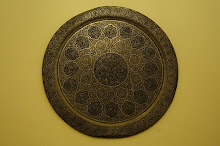The following is the first in a series of posts highlighting the writing of the great 20th century Argentinian writer, Jorge Luis Borges, who had a fascination with the Islamic world. He wrote about a great diversity of subjects, from Mayan priests to gauchos, but he had a special inclination for unusual individuals and esoteric ideas from the East.
The first is a tale from the book 'A Universal History of Infamy', and it is called 'Hakim, the Masked Dyer of Merv', a city as dry as the dust of the desert around it. In his usual thrifty way, Borges recounts in three pages the story of the man who later became known as Al Muqanna, or the Veiled or Masked One in Arabic.
One day, Hakim disappeared from Merv, in what is now Turkmenistan, leaving behind only broken vats of dye, a shattered brass mirror, and a scimitar from Shiraz. He was not to be seen again until he reappeared to a desert party, masked, accompanied by followers who were blind because "they had looked upon his face".
Fired by revelation, Hakim had become a masked prophet, leading masses in a jihad against the Abbasid Caliph of Baghdad. Al Muqanna claimed that the Angel Gabriel had given him an ancient message of wisdom that burned one's mouth if spoken, and made his face so magnificent that no mortal eyes could look upon him - thus the mask (later exchanged for a mere veil).

He gained several military victories over the Caliph, and spread a message of a Manichaean world of light and dark, and of a god without a name or face. This divinity had nine shadows manifested as 999 descending heavens, each a paler echo of its predecessor. The descent led from angels to the demiurge who rules our world whose "fraction of divinity tends to zero". Our earth is but a murky reflection of that first nameless, faceless Divinity, a kind of hell in contrast with the original Paradise that we could aspire to, or even ascend towards. The Veiled One suggested that the misery we live in is best dealt with through a total immersion in vice, or extreme abstinence.
It is believed by some that his ideas are derived from the Persian Khurramiyyah movement, a mixture of Shiism and Zoroastrianism, that was in turn influenced by Mazdak, an Iranian reformer sometimes described as a 'proto-socialist'. The cosmogeny of ascent and descent of the universe that Al Muqanna propagated is also explained in more modern and scientific terms in the excellent book 'Godhead - The Brain's Big Bang'. John Zada, of this blog, recently published an interview with its authors, Joe Griffin and Ivan Tyrrell.
As he was revealed, Hakim stuck to his lifetime chorus, shouting that the sinful were forbidden to look upon his face. The plea did not save him; instead, he was "riddled with spears" and disappeared into the Universal History of Infamy - or so the great Argentinian writer (below) tells us.















1 comment:
thanks for this blog.
Post a Comment